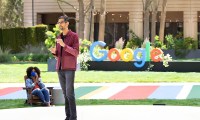Google has adopted the Monk Skin Tone (MST) Scale for use across its software and products to ensure all kinds of skin tones are accurately portrayed and represented on the internet. The MST Scale is the work of Harvard professor and sociologist Dr. Ellis Monk, and is a 10-point scale that help machines better understand and therefore better represent more varied skin tones. It’s a considerable step up from the six-point scale commonly used online today.
The 10-point scale has been validated through a U.S. study launched by Google Research, which asked people from a range of different communities if they felt their skin tone was represented on it. Why only 10 points and not 100, or 1,000? Dr. Ellis explains:
“You only pick so many tones to use in the scale because of cognitive latency issues. If you have a scale with too many points, that’s impractical for humans and from an A.I. point of view, furthermore, it becomes a problem when a scale is too large.”
The MST Scale with its 10 points has enough variation that it reflects more people than the current model, yet doesn’t increase complexity, enabling computers and software to adapt to it quickly. However, this is not its absolutely final state. Google says the scale and the A.I. that supports it are a work in progress, and it’s seen as an initial step in the right direction. The MST Scale is open source and through partnerships in the industry, it will be used to improve images and content online as part of an effort to make the internet more inclusive.

Where will we see the MST Scale in action? Google specifically mentions Google Images, where an option to refine results by including skin tone will be added. The MST Scale will then help provide results that better suit you. The MST Scale will also come to Google Photos through a series of new Real Tone filters added to it, which are designed using the scale to better accommodate more skin tones. These will be coming to the iOS and Android Google Photos app in the coming weeks.
The MST Scale continues the work Google started in 2021 under the name Real Tone, where the Pixel 6 and Pixel 6 Pro’s cameras used A.I. and other tools to better render different skin tones. The Real Tone tool was also built into the Auto Enhance feature in Google Photos.
Take a look at the 10-point MST Scale here, where Google has even made the scale available with HEX codes, and the shades are easily copied and pasted for your own use. The use of the MST Scale is part of the company’s Google I/O 2022 announcements.
Editors' Recommendations
- Everything announced at Google I/O 2022: Pixel 6a, Pixel Watch, search enhancements and more!
- Pixel 6A case hands-on: More clues about Google’s next phone
- Apple could end antitrust woes by making the iOS App Store more like the Mac’s



